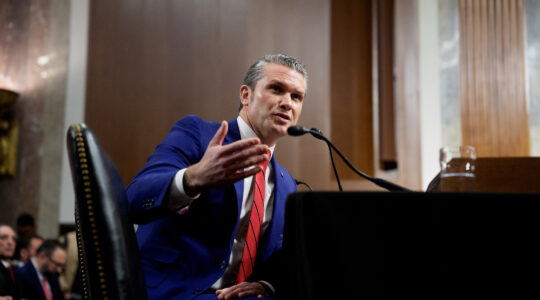WASHINGTON (JTA) – It’s one of the few bright bipartisan spots in a town awash in partisan mud: Republicans and Democrats agree that the tyrants in Sudan and Iran must be isolated, and the sooner the better.
In addition to enjoying bipartisan support, bills that would mandate such isolation also have wall-to-wall Jewish community backing.
So why is a small cadre of Republican lawmakers, led by U.S. Sen. Richard Shelby (R-Ala.), putting the brakes on legislation that would tighten sanctions on both nations?
The question garnered little attention until last week when Sen. Barack Obama (D-Ill.) made it an issue in his presidential bid.
“The Bush administration and an anonymous senator are blocking a bill with bipartisan support that would ratchet up the pressure on the Iranian regime,” Obama said in an op-ed in the New York Daily News. “It’s time for this obstructionism to stop.”
The Democratic hopeful introduced one of the three bills being held up – a measure that would assist states and other groups that seek to divest from Iran by naming companies invested in the Islamic Republic’s energy sector and by protecting divestors from investor lawsuits.
The House version of the bill, initiated by U.S. Rep. Barney Frank (D-Mass.), was passed overwhelmingly before the congressional summer recess.
Obama’s outspokenness against the hold on his bill is unusual. Outside interest groups often will complain about such a maneuver, but in the Senate’s clubby halls it is a prerogative lawmakers often graciously concede to one another.
JTA has learned that Shelby is the GOP lawmaker who initiated the holds on the two Iran bills and a Sudan measure, although a few others have since joined him.
The question of why a Republican leader in the Senate would obstruct the legislation is made more vexing because the White House is ostensibly committed to the very same ideas – isolating Iran until it suspends its suspected nuclear weapons program and Sudan until it facilitates an end to the genocide in the Darfur region.
In fact, the Bush administration just ratcheted up pressure on Tehran by designating Iran’s Revolutionary Guards – a major component of the country’s military – as a terrorist group.
Depending on who’s explaining, the holds have to do with presidential prerogatives or proper parliamentary processes.
“There was widespread objection among Republicans to the bills being hot-lined,” a Republican Senate aide told JTA last week, using a term to describe when a measure bypasses committee hearings for consideration by the full Senate. “Without deliberative process, the possible implications of these bills are unknown.”
Speaking off the record, Jewish communal spokesmen offer a different explanation. They suggest that Shelby is “holding water” for a Bush administration determined to preserve executive prerogative in foreign policy, even to the extent of quashing bills sympathetic to its overseas goals.
An aide to Obama rejected the procedural explanation, noting that multiple hearings were held in the House on the version of the bill introduced by Frank.
“This bill has been through hearings and markup,” the Obama aide said. “The time for deliberation has passed. With Iran threatening the United States, Israel and the stability of the world, the time to act is now.”
In any case, Obama’s bill has been referred twice to the Senate’s banking committee, where it has yet to be considered. What’s been holding up the measure there is unclear. One of Obama’s rivals for the Democratic presidential nomination, U.S. Sen. Chris Dodd (D-Conn.), chairs the committe, and Shelby as the committee’s ranking minority member is also in a position to advance the bill to a hearing.
Also stuck in the banking committee are two other bills that passed overwhelmingly in the House before summer break.
An Iran bill initiated by U.S. Rep. Ileana Ros-Lehtinen (R-Fla.) would extend existing penalties for dealing with Iran to U.S. companies that have set up foreign subsidiaries to bypass the legislation. A separate bill, initiated by Rep. Barbara Lee (D-Calif.), would ban U.S. government dealings with companies that trade with Sudan as long as that country fails to heed international demands that it allow in peacekeepers to police Darfur, the region where government-allied militias have massacred hundreds of thousands of civilians and helped displace millions more.
The hold on the Sudan bill already has earned the censure of the Reform movement, which has helped lead the campaign to raise awareness in the United States about the killings in Darfur. In July, Rabbi David Saperstein, the director of the movement’s Religious Action Center, called the hold an “inexcusable disgrace” that “brings disrepute” to Senate rules.
“Nothing can excuse the use of a Senate courtesy rule to prevent Senate action on the most catastrophic genocidal activity of this generation,” Saperstein wrote to Sen. Harry Reid (D-Nev.), the majority leader, and Sen. Mitch McConnell (R-Ky.), the minority leader. “It thwarts the will of our nation.”
The three bills in question are small change, the Jewish sources say, compared to another bill, sponsored by Rep. Tom Lantos (D-Calif.), the chairman of the House Foreign Affairs Committee, that Democrats are determined to see through in the coming months.
The Lantos bill would sanction third parties that deal with Iran’s energy sector and severely restrict Bush’s ability to waive such measures.
Danielle Pletka, a vice president of the American Enterprise Institute who is close to the White House, wrote in a Washington Post op-ed last week that the Iran-related bills are ill timed. Europe is finally coming around to a realization of the Iranian threat, she pointed out, and targeting European companies for sanctions now would roll back the hope of a unanimous front against the Islamic regime.
“For many years, a key element of Iranian strategy has been to divide Europe from the United States, leaving America with only unilateral options,” wrote Pletka, a former senior legislative aide to former Sen. Jesse Helms (R-N.C.), who headed the Foreign Relations Committee during the Clinton administration. “It would be a cruel irony if, just as European governments finally begin doing the right thing, Congress deepens the Atlantic rift.”
JTA has documented Jewish history in real-time for over a century. Keep our journalism strong by joining us in supporting independent, award-winning reporting.





